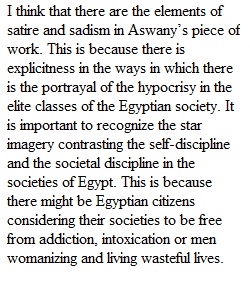


Q Aswany's narrative style functions in a way where the audience has to look deeper into narrative to find the symbolism behind the different relationships and stories in The Yacoubian Building. For example, when Taha is not accepted into the police and he joins an Islam group out of anger. The narrative is commenting on the governments corruption and how it is only growing young peoples hate towards the government causing them to seek refuge in groups like the one that Taha joined. Then, the narrative is also very blunt and real. This brings out one of the bigger themes of the narrative which is necessity versus pride. Most of the characters experience needing something and meeting corrupted people who are willing to meet that need. The characters have to choose whether to let go of their pride or remain in need. For example, Souad was managing to somehow make a living with her son but when a rich man comes and offers her marriage in exchange of taking care of her and her son, she says yes. Even though in exchange she couldn't tell anyone about the marriage or see her only son. Yet, fulfilling the necessity and not being poor anymore seemed to be more important.
View Related Questions